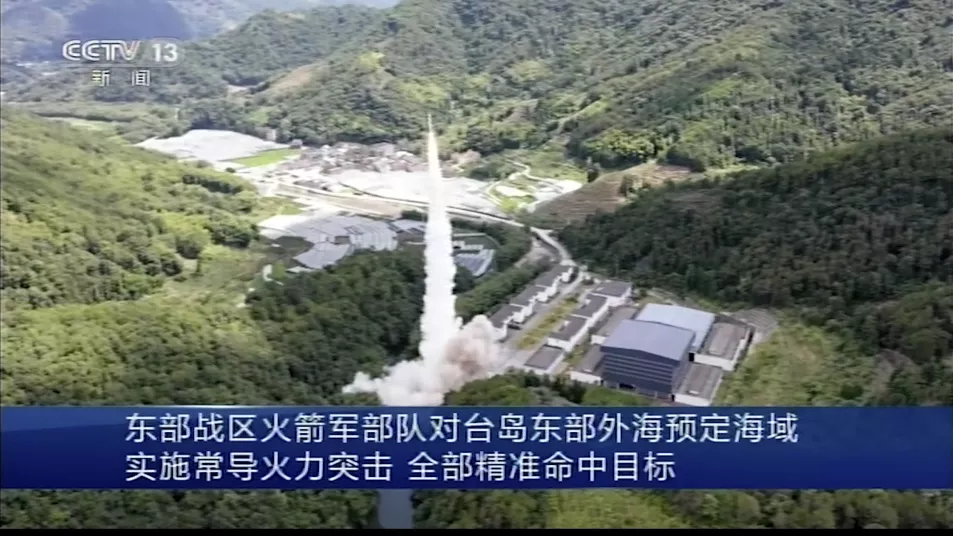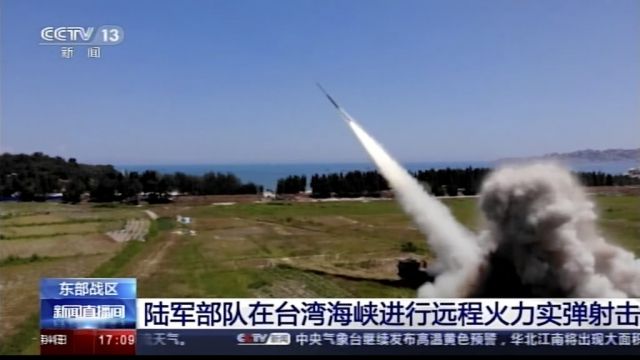China has conducted “precision missile strikes” in the Taiwan Strait and in the waters off the eastern coast of Taiwan as part of military exercises that have raised tensions in the region to their highest level in decades.
Beijing earlier announced that military exercises by its navy, air force and other departments were under way in six zones surrounding Taiwan, which Beijing claims as its own territory to be annexed by force if necessary.
Five of the missiles landed inside Japan’s Exclusive Economic Zone off its coast, Japanese defence minister Nobuo Kishi said. He added that Tokyo protested to China over the “serious threats to Japan’s national security and the safety of the Japanese people”.

The missiles landed off Hateruma, an outer island quite far from the main islands of Japan, he said.
The drills were prompted by a visit to Taiwan by the speaker of the US House of Representatives, Nancy Pelosi, this week and highlight China’s threat to attack the self-governing island republic.
Along with its moves to isolate Taiwan diplomatically, Beijing has long threatened military retaliation over moves by the island to solidify its de facto independence with the support of key allies including the US.
China fired long-range explosive projectiles, the Eastern Theatre Command of the People’s Liberation Army, the ruling Communist Party’s military wing, said in a statement.
It also said it carried out multiple conventional missile launches in three areas in the eastern waters off Taiwan. An accompanying graphic on state broadcaster CCTV showed those occurred in the north, east and south.

“All missiles hit the target accurately,” the Eastern Theatre said in its announcement.
Taiwan’s Defence Ministry said it tracked the firing of Chinese Dongfeng series missiles on Thursday, using early warning surveillance systems. It later said it counted 11 Dongfeng missiles in the waters in the north, east and south.
The ministry also said it tracked long-distance rockets and ammunition firing in outlying islands in Matsu, Wuqiu and Dongyin.
Taiwanese President Tsai Ing-wen criticised the drills in a public video address, saying China “destroyed the status quo and violated our sovereignty” with its “irresponsible actions”.
She urged Beijing to be “reasonable and restrained”, adding: “We are calm and not impulsive, we are reasonable and not provocative. But we will also be firm and not back down.”

Ms Tsai said Taiwan is in communication with its allies to ensure things do not escalate further.
Earlier during the day, the ministry said its forces were on alert and monitoring the situation, while seeking to avoid escalating tensions. Civil defence drills were held last week and notices were placed on designated air raid shelters months ago.
China’s “irrational behaviour” aims to alter the status quo and disrupt regional peace and stability, the ministry said.
“The three service branches will combine efforts with all the people to jointly safeguard national security and territorial integrity” while adapting to the situation as it develops, the statement said.
China’s official Xinhua News Agency reported the exercises were joint operations focused on “blockade, sea target assault, strike on ground targets, and air space control”.

Ma Chen-kun, a professor at Taiwan’s National Defence University, said the drills were aimed at showing off the Chinese military’s ability to deploy precision weapons to cut off Taiwan’s links with the outside and facilitate the landing of troops.
The announced drills are “more complete” than previous exercises, he added.
“If the People’s Liberation Army actually invades Taiwan in an all-out invasion, the concrete actions it will take, it’s all in this particular exercise,” Mr Ma said.
“The main thing is they will cut off Taiwan’s links to the outside world, from their sea, they would suppress the coastal defence firepower,” he said.
US secretary of state Antony Blinken addressed the drills on Thursday saying: “I hope very much that Beijing will not manufacture a crisis or seek a pretext to increase its aggressive military activity.
“We countries around the world believe that escalation serves no one and could have unintended consequences that serve no one’s interests.”







